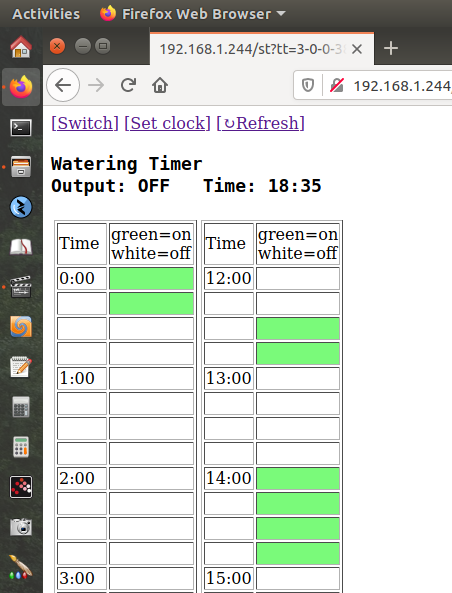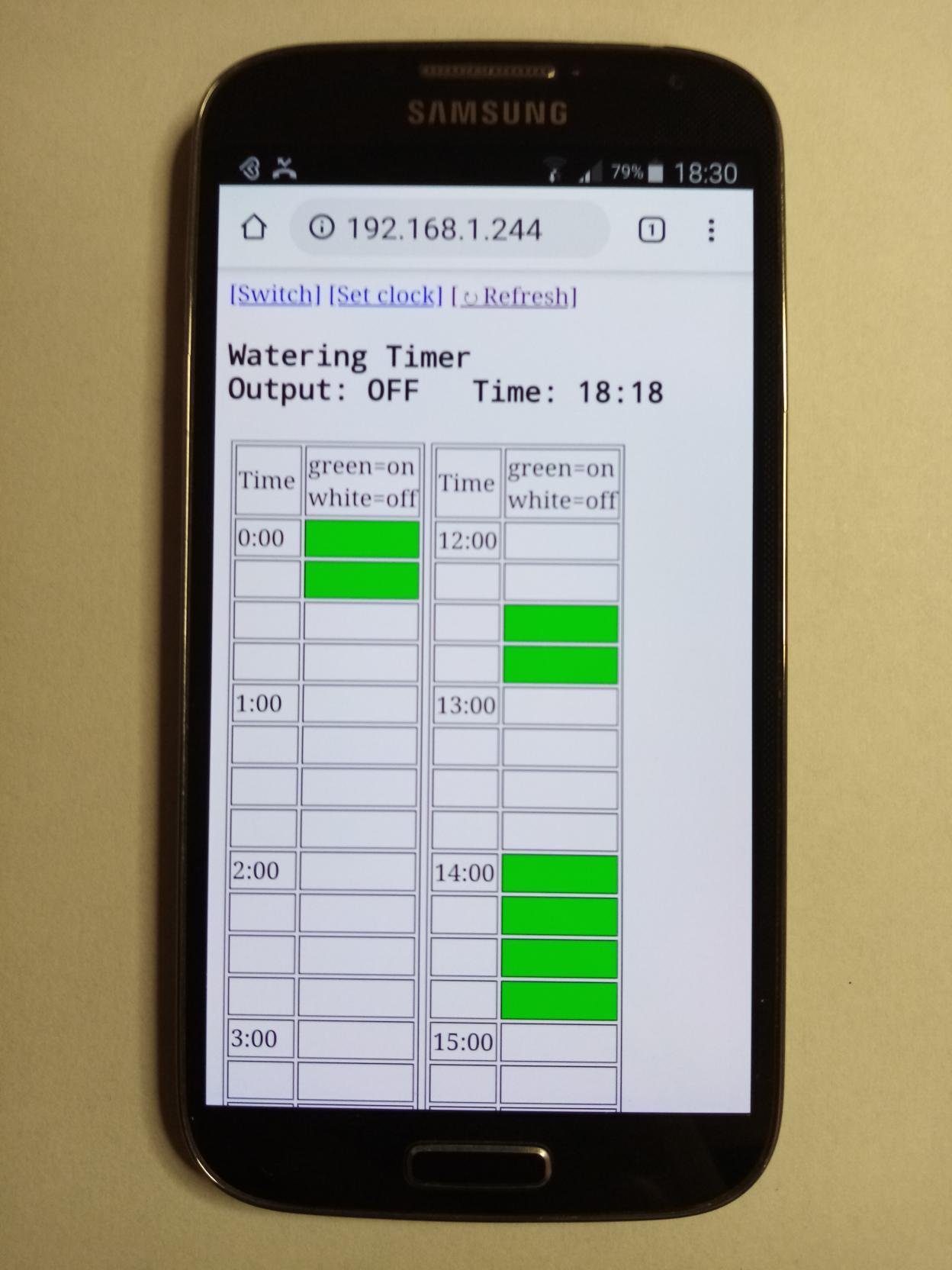A remote timer, equipped with a scheduling Web interface, controls a "DigitalOut".
Dependencies: Timezone NTPClient
WebTimer
The WebTimer is an Mbed device enabling to remotely control a DigitalOut. It has a "calendar-like" user interface to edit the schedule - a table you can click on (or tap on a touch-screen device).
The program was ported to Mbed from the Tuxgraphics site. Thank you Guido for sharing!
- When starting, it will print it's IP address over the USB serial link to the terminal screen. However, you can set a different static IP address if you modify the code in the
main.cpp. - To connect to the WebTimer, type the IP address into the web browser edit box and hit
ENTER. - When a cell is green then the timer keeps it's output
ONduring that period of time. If a cell is not green it means the output isOFF.
- To select or deselect multiple cells you can click (keep down the button) and move the mouse over more cells.
- The smallest time interval on this 24h timer is 15minutes.
- To save the changes type in the password and hit
ENTERor click on theSavebutton. - The default password is "secret". But you can change it by editing the source code in
main.cpp.
 |  |
websrv_help_functions.c
- Committer:
- hudakz
- Date:
- 2020-11-11
- Revision:
- 0:f78e57015038
File content as of revision 0:f78e57015038:
/*********************************************
* vim:sw=8:ts=8:si:et
* To use the above modeline in vim you must have "set modeline" in your .vimrc
* Author: Guido Socher
* Copyright:LGPL V2
* See http://www.gnu.org/licenses/old-licenses/lgpl-2.0.html
*
* Some common utilities needed for IP and web applications.
* The defines below are controlled via ip_config.h. By choosing
* the right defines for your application in ip_config.h you can
* significantly reduce the size of the resulting code.
*********************************************/
#include <stdlib.h>
#include <stdio.h>
#include <string.h>
#include <ctype.h>
#include "websrv_help_functions.h"
#ifdef FROMDECODE_websrv_help
// search for a string of the form key=value in
// a string that looks like q?xyz=abc&uvw=defgh HTTP/1.1\r\n
// The returned value is stored in strbuf. You must allocate
// enough storage for strbuf, maxlen is the size of strbuf.
// I.e the value it is declared with: strbuf[5]-> maxlen=5
uint8_t find_key_val(char* str, char* strbuf, uint8_t maxlen, char* key)
{
uint8_t found = 0;
uint8_t i = 0;
char* kp;
kp = key;
while (*str && *str != ' ' && *str != '\r' && found == 0) {
if (*str == *kp) {
// At the beginning of the key we must check
// if this is the start of the key otherwise we will
// match on 'foobar' when only looking for 'bar', by andras tucsni
if (kp == key && !(*(str - 1) == '?' || *(str - 1) == '&'))
goto NEXT;
kp++;
if (*kp == '\0') {
str++;
kp = key;
if (*str == '=') {
found = 1;
}
}
}
else {
kp = key;
}
NEXT:
str++;
}
if (found == 1) {
// copy the value to a buffer and terminate it with '\0'
while (*str && *str != ' ' && *str != '\r' && *str != '&' && i < maxlen - 1) {
*strbuf = *str;
i++;
str++;
strbuf++;
}
*strbuf = '\0';
}
// return 1 if found (the string in strbuf might still be an empty string)
// otherwise return 0
return(found);
}
// convert a single hex digit character to its integer value
unsigned char h2int(char c)
{
if (c >= '0' && c <= '9') {
return((unsigned char)c - '0');
}
if (c >= 'a' && c <= 'f') {
return((unsigned char)c - 'a' + 10);
}
if (c >= 'A' && c <= 'F') {
return((unsigned char)c - 'A' + 10);
}
return(0);
}
// decode a url string e.g "hello%20joe" or "hello+joe" becomes "hello joe"
void urldecode(char* urlbuf)
{
char c;
char* dst;
dst = urlbuf;
while ((c = *urlbuf)) {
if (c == '+')
c = ' ';
if (c == '%') {
urlbuf++;
c = *urlbuf;
urlbuf++;
c = (h2int(c) << 4) | h2int(*urlbuf);
}
*dst = c;
dst++;
urlbuf++;
}
*dst = '\0';
}
#endif // FROMDECODE_websrv_help
#ifdef URLENCODE_websrv_help
// convert a single character to a 2 digit hex str
// a terminating '\0' is added
void int2h(char c, char* hstr)
{
hstr[1] = (c & 0xf) + '0';
if ((c & 0xf) > 9) {
hstr[1] = (c & 0xf) - 10 + 'a';
}
c = (c >> 4) & 0xf;
hstr[0] = c + '0';
if (c > 9) {
hstr[0] = c - 10 + 'a';
}
hstr[2] = '\0';
}
// There must be enough space in urlbuf. In the worst case that would be
// 3 times the length of str
void urlencode(const char* str, char* urlbuf)
{
char c;
while ((c = *str)) {
if (c == ' ' || isalnum(c)) {
if (c == ' ') {
c = '+';
}
*urlbuf = c;
str++;
urlbuf++;
continue;
}
*urlbuf = '%';
urlbuf++;
int2h(c, urlbuf);
urlbuf++;
urlbuf++;
str++;
}
*urlbuf = '\0';
}
#endif // URLENCODE_websrv_help
// parse a string that is an IP address and extract the IP to ip_byte_str
uint8_t parse_ip(uint8_t* ip_byte_str, const char* str)
{
char strbuf[4];
uint8_t bufpos = 0;
uint8_t i = 0;
while (i < 4) {
ip_byte_str[i] = 0;
i++;
}
i = 0;
while (*str && i < 4) {
// if a number then start
if (bufpos < 3 && isdigit(*str)) {
strbuf[bufpos] = *str; // copy
bufpos++;
}
if (bufpos && *str == '.') {
strbuf[bufpos] = '\0';
ip_byte_str[i] = (atoi(strbuf) & 0xff);
i++;
bufpos = 0;
}
str++;
}
if (i == 3) {
// must have read the first componets of the IP
strbuf[bufpos] = '\0';
ip_byte_str[i] = (atoi(strbuf) & 0xff);
return(0);
}
return(1);
}
// take a byte string and convert it to a human readable display string (base is 10 for ip and 16 for mac addr), len is 4 for IP addr and 6 for mac.
void mk_net_str(char* resultstr, uint8_t* ip_byte_str, uint8_t len, char separator, uint8_t base)
{
uint8_t i = 0;
uint8_t j = 0;
while (i < len) {
sprintf(resultstr, base == 10 ? "%i" : "%x", (int)ip_byte_str[i]);
// search end of str:
while (resultstr[j]) {
j++;
}
if (separator) {
// no separator, separator==NULL is as well possible, suggested by andras tucsni
resultstr[j] = separator;
j++;
}
i++;
}
j--;
resultstr[j] = '\0';
}